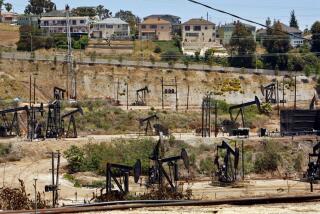‘Nuclear Winter’ Fears Unfounded--Experts
- Share via
Fears that Saddam Hussein could set off a fire storm in Kuwait’s 850 or so oil wells have raised the specter of a world-scale environmental disaster, with billowing clouds of black smoke that could eventually create a “nuclear winter.”
Not so, oil experts said Monday.
At worst, 1 million to 2 million barrels of oil a day would be burned in Kuwait, said Larry Flak, chief engineer for OGE Drilling Co. in Houston. That is less oil than residents of the Los Angeles area consume in a 24-hour period and only a tiny fraction of Kuwait’s estimated reserves of 94.5 billion barrels.
The thickest smoke would be driven thousands of feet into the air by the fire’s heat, meaning that U.S. aircraft would still have a good view of the ground, according to Flak, who has flown in small planes over many a blowout.
“The consequences of (oil wells) burning for a while--tactically or environmentally--are not that great,” said Flak, whose company provided drilling services in Kuwait before the Aug. 2 Iraqi invasion.
“It’ll be a nasty job for a while,” said Flak, who coordinates oil companies’ efforts to control blowouts. But getting fires under control, while expensive and technically challenging, would “not be an impossible task by any means.”
Flak, who became interested in the business after a well on which he was roughnecking at age 19 erupted in flames, said he believes that most blowouts could be contained in six to 10 months, once it was safe for firefighters to enter the region.
“No one is going to go fight oil-well fires in Kuwait with bullets and bombs flying,” he said.
The Kuwaitis--who lost control of their oil fields when Iraq marched into their small country--”are making contingency plans for dealing with this,” said Basil Butler, managing director of British Petroleum Co.
Reached in London by car phone, Butler said he was driving home from a seminar where Kuwaiti refugees and other oil industry officials discussed the potential for sabotage in the oil fields. Butler worked in Kuwait for 13 years, until the oil industry was nationalized in 1975.
From oil field personnel who have left Kuwait, Butler said there seemed to be “a good deal of evidence” that Iraqi saboteurs have attached explosives to the control valves on as many as 200 Kuwaiti wells, putting them at immediate risk.
“No one is pretending that the consequences of sabotage will not be extremely unpleasant and wasteful,” Butler wrote last week in a commentary for the Guardian newspaper in London, “but the problems are not insurmountable.”
Several factors argue against a catastrophic burning of the rest of Kuwait’s rich reserves.
To begin with, Butler said, wells are spread throughout the country, with some 50 or more miles apart, making it unlikely Iraq could sabotage or bomb all of them.
Moreover, since the reserves are thousands of feet below ground--where no oxygen exists to feed flames--the only oil at risk would be that flowing freely from wells. Many oil wells in Kuwait flow freely, however, only if the control valves have been opened, Flak said.
More to Read
Sign up for Essential California
The most important California stories and recommendations in your inbox every morning.
You may occasionally receive promotional content from the Los Angeles Times.














